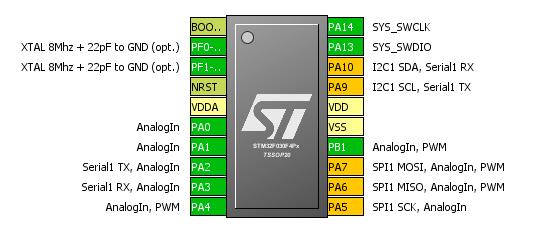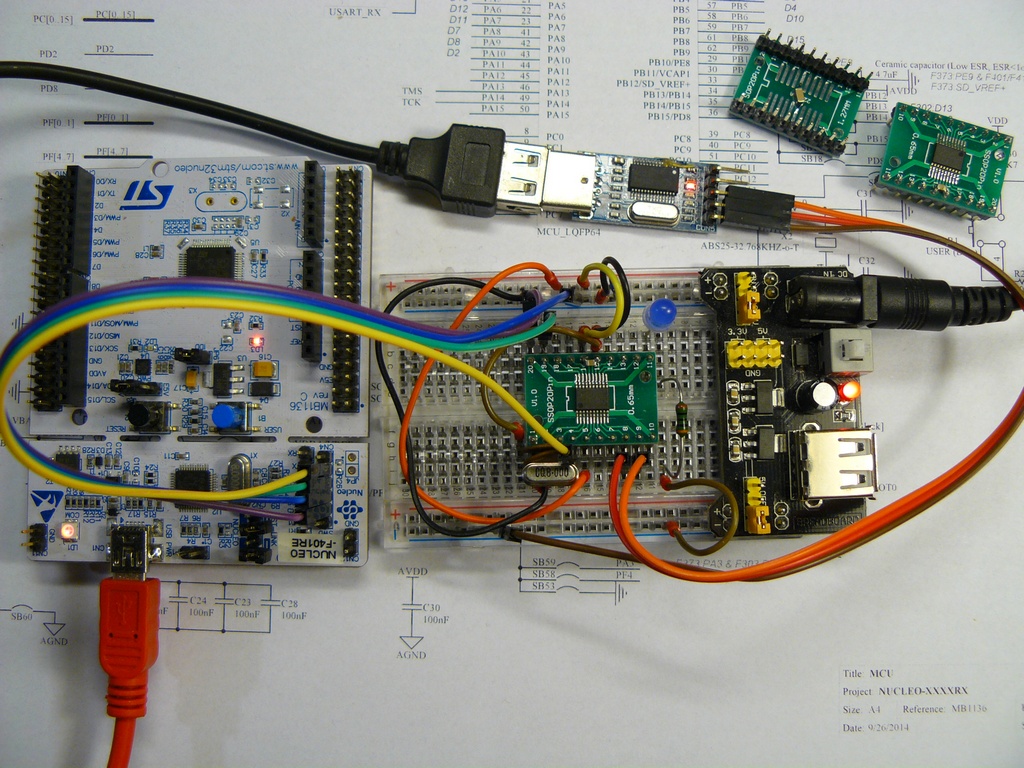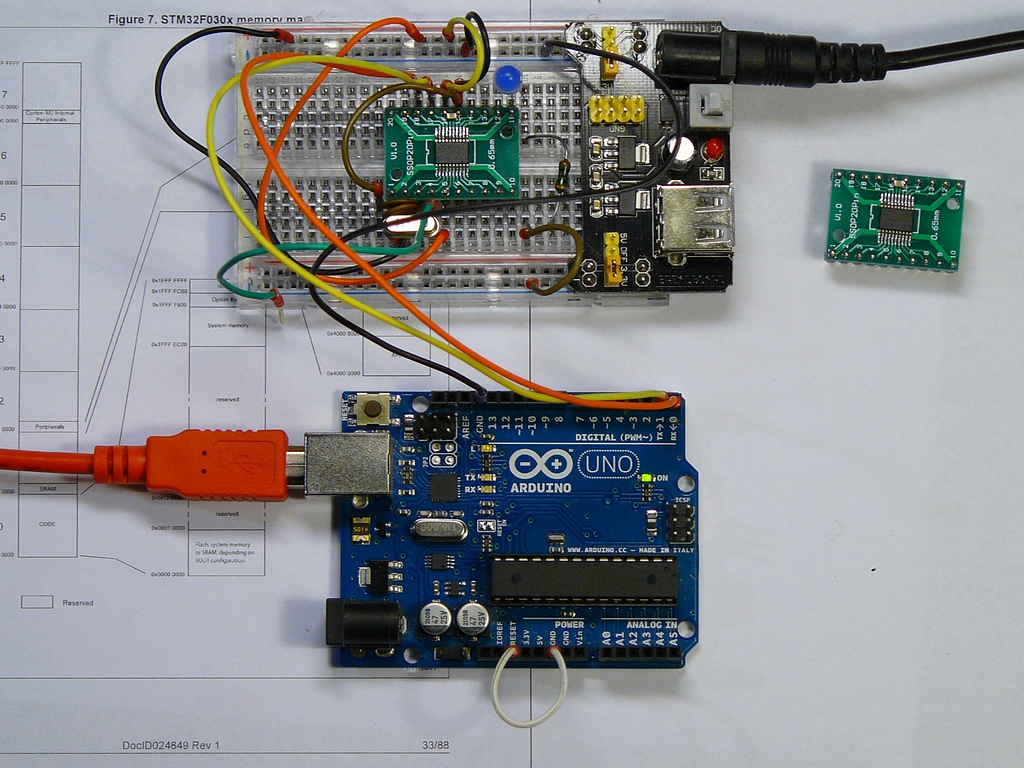Modification of mbed-src library only for STM32F030F4, very cheap microcontroller in 20-Pin TSSOP package, with 16Kbytes of Flash and 4Kbytes of Ram. **Target for online compilator must be Nucleo 32F030R8.**
Dependents: STM32F031_blink_LED_2
Information
For programming similar chips in TSSOP20 package, but with 32kB flash: STM32F031F6 and STM32F050F6 (virtually identical to STM32F031F6 and no longer produced but still on sale), it is recommended to use NUCLEO-F031K6 as compiler platform, and the mbed library without the need for any modifications.
Just remember that the only significant difference between these chips and NUCLEO-F031K6 is the lack of pins: PB_0, PB_3, PB_4, PB_5, PB_6, PB_7, PA_11, PA_12, PA_15 in TSSOP-20.
STM32F030F4 pinout (pin functions supported in mbed library).

other pins:
| Pin nr | Pin name | Connected | ST-LINK on Nucleo (programming and debug) |
|---|---|---|---|
| 1. | BOOT0 | GND | |
| 4. | NRST | CN4 pin 5 | |
| 5. | VDDA | +3.3V | |
| 15. | VSS | GND | CN4 pin 3 |
| 16. | VDD | +3.3V | |
| 19. | SWDIO | CN4 pin 4 | |
| 20. | SWCLK | CN4 pin 2 |
- Remove jumpers CN2 on Nucleo when CN4 is connected to STM32F030F4
- NRST connection is not necessarily needed, but in this case, after programming it is necessary to manually reset the target processor
STM32R030F4 programming using Nucleo (any type):
 Notes:
Notes:
- When programming using the Nucleo virtual disk (drag and drop) , first turn on the power STM32F030F4, and then connect Nucleo to USB. When programming with "ST-LINK Utility", it does not matter.
STM32R030F4 programming using Arduino (as a simple USB-Serial converter) and FlyMcu program:

Notes:
- For Usart in STM32F030F4, only 5V tolerant TX, RX pins are pins 17 and 18. Just their uses internal serial bootloader, so you can use such Arduino or other USB-Serial converter operating as standard 5V.
- Where used FlyMcu, binary file from online compiler Mbed need to convert to intel hex file and during the conversion add the data offset 0x08000000 (or if offset is 0, manually add/edit the first line of the .hex file to ":020000040800F2").
- During programming procedure, pin 1 (BOOT0) should be connected to 3.3 V. And before contact with the loader program, temporarily pin 4 (NRST) shorted to GND to reset the chip. After programming BOOT0 is connected to GND.
- In this set with Arduino Uno, the "Flash loader demonstrator" from STM does not work (does not recognize the response from the chip at the initial stage of connection). But with Arduino Duemilanove program "STM Flash loader demonstrator" works perfectly (ver. 2.7.0). And do not need any additional file conversion (as the need for FlyMcu). You can use a binary file directly from the on-line compiler mbed.
Warning.
Because of the small size of the STM32F030F4 flash, for programs that use UART, it is proposed not to use the Serial class but use the <cstdio> (stdio.h) functions that directly use stdout and stdin (e.g printf().putchar(),getchar(),vprintf(),scanf() ).
Example:
version with serial class
#include "mbed.h"
Serial pc(USBTX, USBRX); // tx, rx
int main()
{
pc.printf("Hello World!\n");
}
consuming 13.7kB FLASH and 1.5kB RAM
but this:
version without serial class
#include "mbed.h"
int main()
{
printf("Hello World!\n");
}
consuming only 8.7kB FLASH and 0.4kB RAM
5kB used flash difference (with 16kB total size) !!!
However, if you need other than the default UART settings for stdin and stdout (that is 9600b, pins PA_2, PA_3), you can do as an example:
change uart pins and speed
#include "mbed.h"
// declarations needed to change here the parameters of stdio UART
extern int stdio_uart_inited;
extern serial_t stdio_uart;
int main()
{
// for change pins
serial_init(&stdio_uart, PA_9,PA_10);
stdio_uart_inited=1;
// for change baud rate
serial_baud(&stdio_uart, 115000);
printf("Hello World!\n");
}
uVision users
In the case of online compilation of the program with this library using Keil, to prevent linker errors set in the project options "One ELF Section per Function" and Optimisation: Level 2.
Additional information (and inspiration for this modification):
http://developer.mbed.org/forum/electronics/topic/5184/
http://developer.mbed.org/questions/4643/Does-mbed-support-STM32F030F4/
http://developer.mbed.org/questions/2927/mbed-on-other-packages-stm32f030f4-TSSOP/
http://developer.mbed.org/questions/4139/Programming-STM32F030F4-with-Nucleo-F030/
History
repair the effects of improvements in the mbed environment (Ch.1, serial_set_flow_control )
2017-02-14, by mega64 [Tue, 14 Feb 2017 21:52:10 +0000] rev 11
repair the effects of improvements in the mbed environment (Ch.1, serial_set_flow_control )
Removing compilation warnings of macro redefinition
2016-09-02, by mega64 [Fri, 02 Sep 2016 19:44:28 +0000] rev 10
Removing compilation warnings of macro redefinition
Sleep mode bug fix
2015-08-13, by mega64 [Thu, 13 Aug 2015 01:59:33 +0000] rev 9
Sleep mode bug fix
update Timer::start() to comply with the behavior of mbed-src version 90 and later (start when running not reseting time)
2015-08-10, by mega64 [Mon, 10 Aug 2015 23:44:25 +0000] rev 8
update Timer::start() to comply with the behavior of mbed-src version 90 and later (start when running not reseting time)
~200 bytes flash save (DEVICE_STDIO_MESSAGES define to 0)
2014-11-19, by mega64 [Wed, 19 Nov 2014 16:28:35 +0000] rev 7
~200 bytes flash save (DEVICE_STDIO_MESSAGES define to 0)
reduce size (runtime errors strings)
2014-11-16, by mega64 [Sun, 16 Nov 2014 20:16:20 +0000] rev 6
reduce size (runtime errors strings)
size reduction (debug info)
2014-11-12, by mega64 [Wed, 12 Nov 2014 01:02:31 +0000] rev 5
size reduction (debug info)
to tests;
2014-11-10, by mega64 [Mon, 10 Nov 2014 23:56:41 +0000] rev 4
to tests;
change uart,pwm,i2c,spi
2014-11-10, by mega64 [Mon, 10 Nov 2014 05:43:20 +0000] rev 3
change uart,pwm,i2c,spi
only gpio working
2014-11-10, by mega64 [Mon, 10 Nov 2014 01:43:37 +0000] rev 2
only gpio working